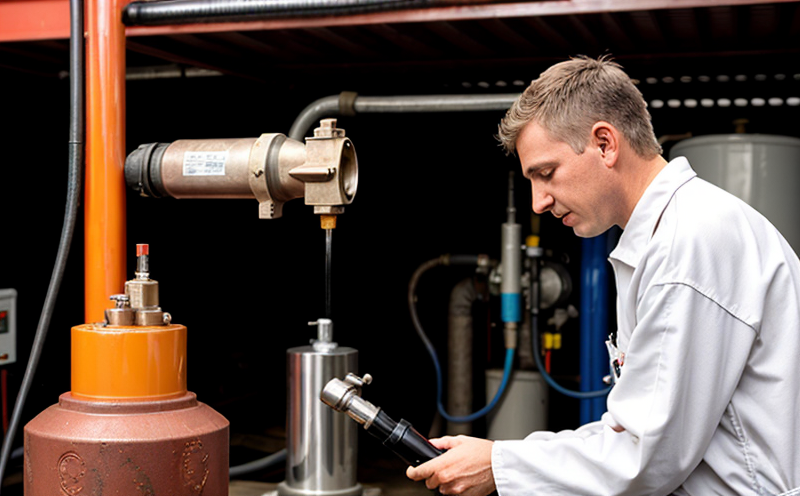ISO 4262 Viscosity Measurement of Aviation Fuels
The measurement of viscosity in aviation fuels is critical to ensuring safe and efficient aircraft operations. ISO 4262 specifies the method for determining the kinematic viscosity of aviation fuels by capillary viscometry at a temperature of 100°C (212°F). This standard ensures that fuel quality meets stringent requirements, thereby enhancing engine performance and reliability.
Aviation fuels are subjected to rigorous testing under controlled conditions because they must operate efficiently across various environmental temperatures. The viscosity of aviation fuels is particularly important as it can affect the flow characteristics through an aircraft’s engine fuel system. A slight change in viscosity could lead to reduced fuel efficiency or even engine failure.
During the test, a sample of the fuel is drawn into a capillary viscometer and allowed to flow through it at a controlled temperature. The time taken for a fixed volume of fuel to pass through the capillary is measured accurately using stopwatches synchronized with precision clocks. This method ensures consistency and repeatability in viscosity readings.
The test apparatus used includes a capillary viscometer, a thermostatically controlled water bath, a thermometer, a stopwatch, and a balance for weighing the fuel sample. The procedure is standardized to minimize errors and ensure accurate results. The aviation industry relies on precise measurements of fuel properties like viscosity because even small variations can have significant implications.
The importance of this test cannot be overstated, especially in the context of international aviation regulations such as those set forth by the International Civil Aviation Organization (ICAO). Compliance with ISO 4262 is essential for manufacturers and operators to ensure that their fuels meet the stringent quality standards required for safe flight operations.
Understanding the viscosity behavior of aviation fuels under different conditions helps in optimizing fuel flow rates, improving engine performance, and minimizing wear on critical components. This knowledge is vital not only during manufacturing but also throughout the lifecycle of an aircraft’s fuel system, from initial blending to final usage.
The standard procedure for testing ensures that all samples are handled uniformly, reducing variability and enhancing reliability. By adhering strictly to ISO 4262, laboratories can provide consistent and accurate results, which is crucial for maintaining the integrity of aviation fuels.
Compliance with this international standard not only enhances safety but also supports the continuous improvement of fuel formulations. This process involves ongoing research and development aimed at developing fuels that are more efficient, cleaner-burning, and capable of withstanding a wider range of operating conditions.
Benefits
The ISO 4262 Viscosity Measurement of Aviation Fuels service offers several key benefits to stakeholders in the aerospace and aviation sectors. Firstly, it ensures that fuel meets international quality standards, which is critical for compliance with regulatory requirements.
By adhering to this standard, manufacturers can enhance their reputation for delivering high-quality products, thereby gaining a competitive edge in the market. Compliance also facilitates smoother interactions between suppliers and end-users, reducing disputes over fuel performance and reliability.
The accurate measurement of viscosity helps in optimizing fuel flow rates, which is essential for maintaining engine efficiency and reducing wear on critical components. This results in longer operational life cycles and reduced maintenance costs.
From a safety perspective, the consistent quality of aviation fuels ensures that engines perform reliably under all conditions, minimizing risks during flight operations. This contributes to enhanced safety standards within the industry.
The service also supports ongoing research and development efforts by providing reliable data on fuel properties. This information is invaluable for refining fuel formulations and exploring new technologies aimed at improving performance and sustainability.
By offering this specialized testing, our laboratory helps clients navigate complex regulatory landscapes while ensuring that their products meet the highest quality standards. This not only builds trust among stakeholders but also fosters innovation within the industry.
Industry Applications
| Application | Description |
|---|---|
| Engine Fuel Systems Testing | Determining the viscosity of fuel to ensure optimal flow rates and prevent blockages. |
| New Fuel Formulation Development | Testing fuels under development for their performance characteristics and compliance with standards like ISO 4262. |
| Aircraft Maintenance and Repair | Evaluating fuel quality during routine checks to ensure safe operations. |
| Supply Chain Management | Verifying fuel quality at various stages of distribution to maintain consistency in product quality. |
| Regulatory Compliance | Ensuring that aviation fuels meet international regulatory requirements for safe and efficient operations. |
| Sustainability Initiatives | Evaluating the performance of biofuels and other alternative fuels under ISO 4262 standards. |
International Acceptance and Recognition
The ISO 4262 standard for viscosity measurement of aviation fuels is widely recognized and accepted across the global aerospace industry. This international standard is enforced by various regulatory bodies, including the International Civil Aviation Organization (ICAO), which sets safety standards for all aspects of civil aviation.
Compliance with this standard ensures that fuel quality meets stringent requirements, thereby enhancing engine performance and reliability. The use of ISO 4262 in testing is a key factor in maintaining the integrity of aviation fuels worldwide.
The widespread acceptance of this standard among manufacturers, operators, and regulatory bodies underscores its importance in ensuring safe and efficient aircraft operations. By adhering to these international standards, laboratories can provide consistent and accurate results that are trusted by all stakeholders.
This global recognition also facilitates smoother interactions between suppliers and end-users, reducing disputes over fuel performance and reliability. The consistency of results from ISO 4262 testing ensures that the aviation industry operates under a unified set of quality standards, fostering trust and confidence in the supply chain.
The commitment to this international standard not only enhances safety but also supports ongoing research and development efforts aimed at improving fuel formulations and exploring new technologies for enhancing performance and sustainability.





